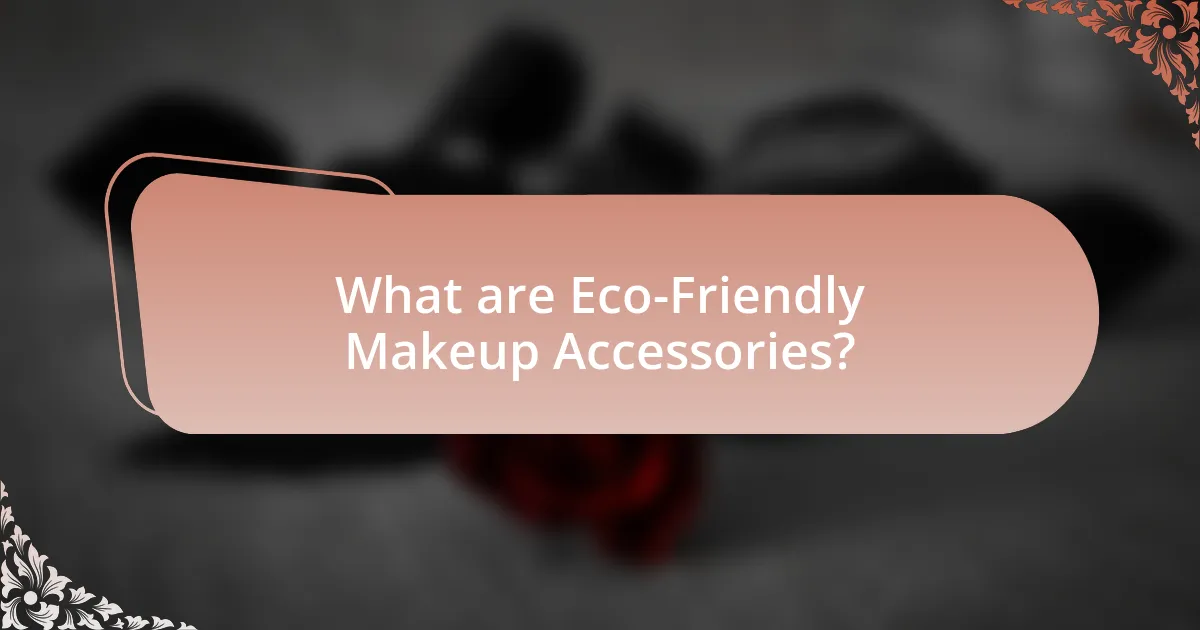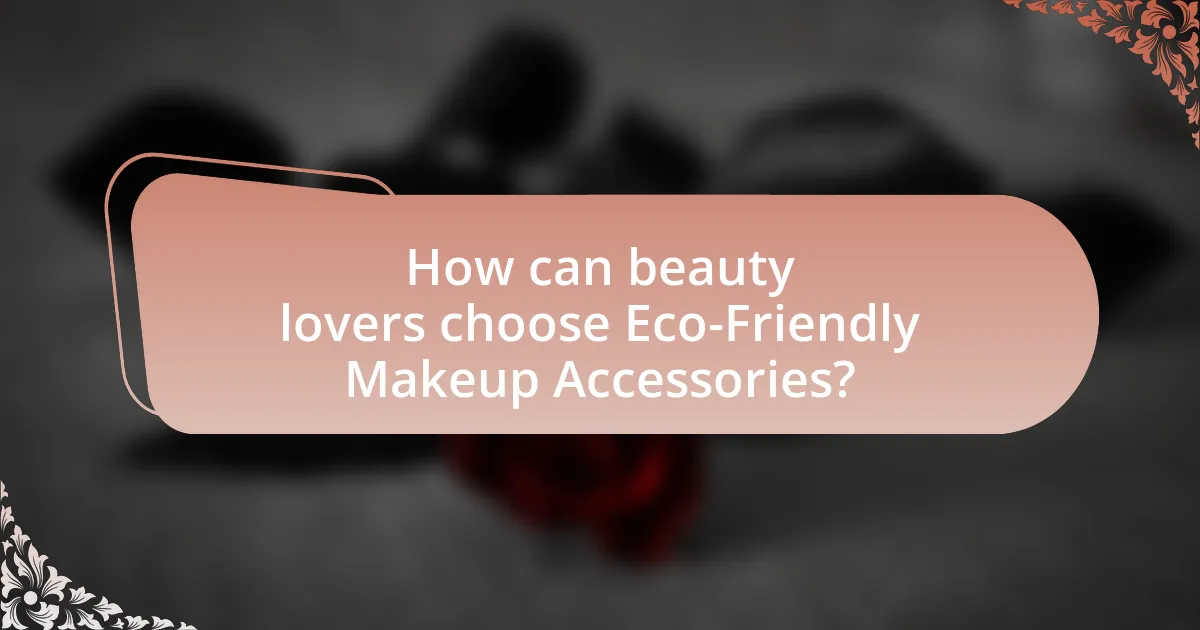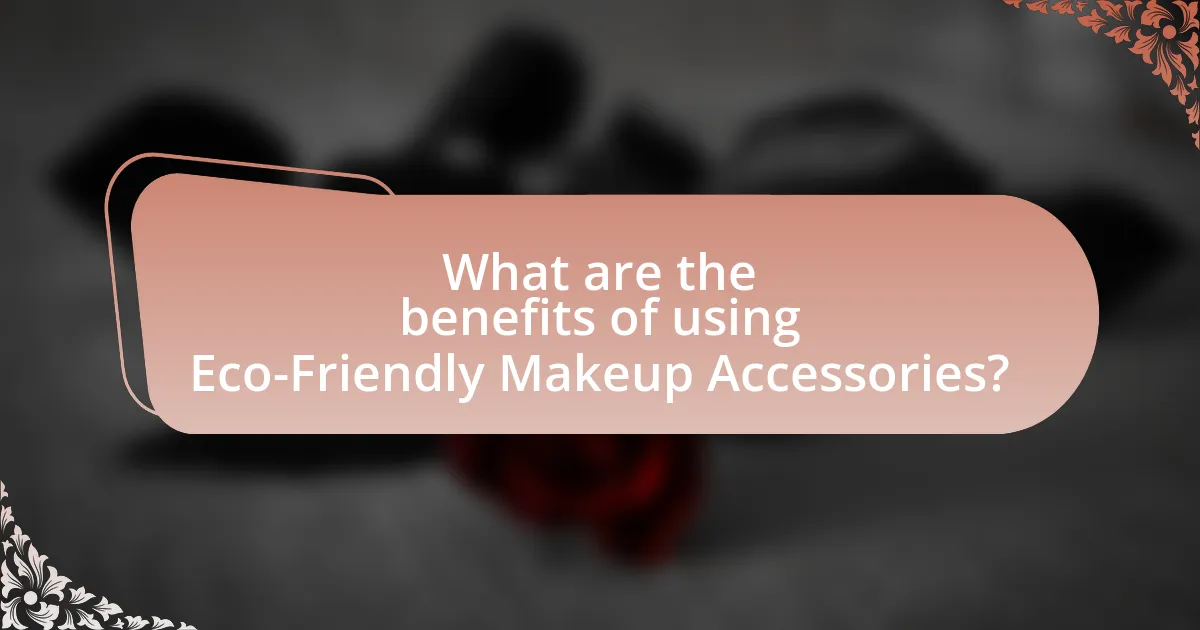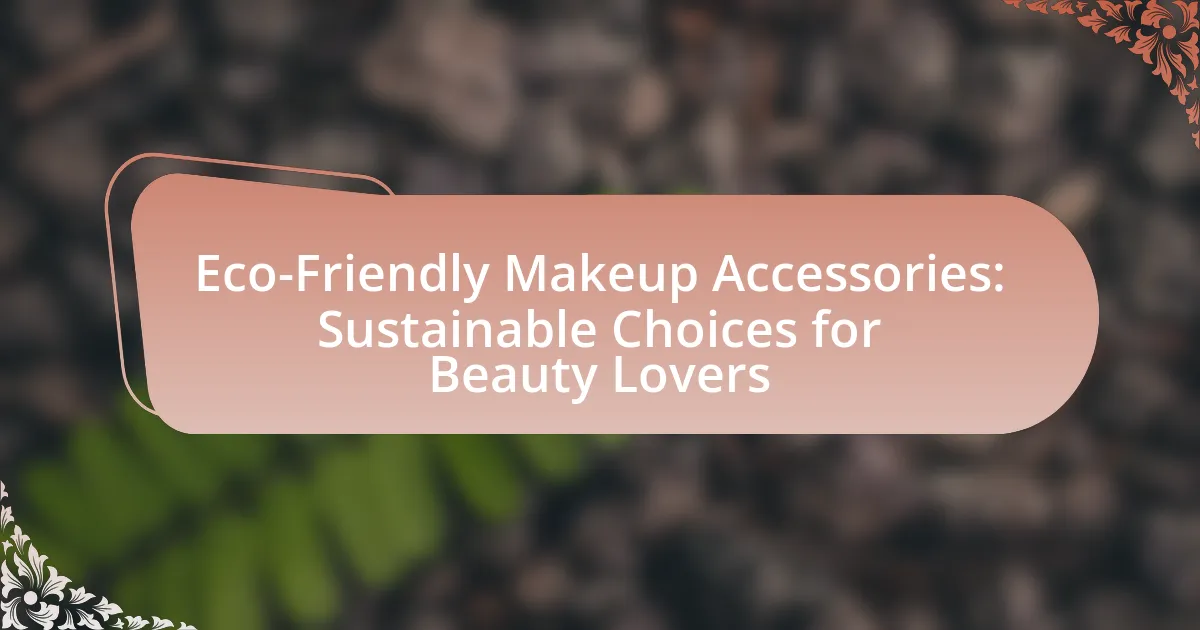Eco-friendly makeup accessories are beauty tools and products crafted from sustainable materials and practices aimed at minimizing environmental impact. This article explores the significance of these accessories for beauty enthusiasts, highlighting their role in promoting sustainability and reducing waste in the beauty industry, which generates over 120 billion units of packaging annually. It discusses the environmental issues associated with traditional makeup accessories, such as plastic waste and chemical pollution, and outlines how eco-friendly options, including biodegradable sponges and bamboo brushes, mitigate these problems. Additionally, the article provides guidance on selecting sustainable beauty tools, maintaining their longevity, and overcoming challenges related to cost and availability, ultimately emphasizing the benefits of adopting eco-friendly practices in personal beauty routines.

What are Eco-Friendly Makeup Accessories?
Eco-friendly makeup accessories are beauty tools and products designed with sustainable materials and practices that minimize environmental impact. These accessories often include items such as biodegradable makeup sponges, brushes made from recycled or sustainable materials, and packaging that is recyclable or compostable. For instance, brands like EcoTools and RMS Beauty focus on using natural and recycled materials, which reduces waste and promotes sustainability in the beauty industry.
Why are Eco-Friendly Makeup Accessories important for beauty lovers?
Eco-friendly makeup accessories are important for beauty lovers because they promote sustainability and reduce environmental impact. These accessories, made from biodegradable or recycled materials, help minimize waste in the beauty industry, which is known for its significant contribution to pollution. For instance, according to a report by the Ellen MacArthur Foundation, the beauty sector generates over 120 billion units of packaging annually, much of which is not recyclable. By choosing eco-friendly options, beauty lovers can support a shift towards more responsible consumption and encourage brands to adopt sustainable practices.
What environmental issues do traditional makeup accessories contribute to?
Traditional makeup accessories contribute to several environmental issues, primarily plastic waste, chemical pollution, and resource depletion. The production and disposal of items like plastic packaging, applicators, and brushes lead to significant amounts of non-biodegradable waste, with an estimated 120 billion units of packaging produced by the global cosmetics industry each year. Additionally, many traditional makeup products contain harmful chemicals that can leach into water systems, affecting aquatic life and ecosystems. The extraction of raw materials for these products also depletes natural resources, contributing to habitat destruction and biodiversity loss.
How do eco-friendly options mitigate these issues?
Eco-friendly options mitigate environmental issues by reducing waste and minimizing harmful chemical usage. For instance, biodegradable makeup brushes and reusable cotton pads significantly decrease landfill contributions compared to single-use products. Additionally, eco-friendly cosmetics often utilize natural ingredients, which lowers the risk of water pollution and skin irritation associated with synthetic chemicals. Research indicates that the beauty industry generates over 120 billion units of packaging annually, much of which is plastic; adopting sustainable alternatives can substantially lessen this impact.
What types of Eco-Friendly Makeup Accessories are available?
Eco-friendly makeup accessories include biodegradable makeup sponges, bamboo makeup brushes, reusable cotton rounds, and compostable makeup wipes. These accessories are designed to minimize environmental impact while maintaining functionality. For instance, bamboo brushes are made from sustainable materials and are often cruelty-free, while biodegradable sponges break down naturally after disposal, reducing landfill waste. Reusable cotton rounds can replace single-use products, significantly decreasing waste over time. Compostable makeup wipes are made from plant-based materials that decompose, offering an eco-friendly alternative to traditional wipes.
What materials are commonly used in sustainable makeup brushes?
Sustainable makeup brushes are commonly made from materials such as bamboo, recycled plastics, and synthetic fibers like Taklon. Bamboo is favored for its rapid growth and biodegradability, making it an eco-friendly handle option. Recycled plastics reduce waste by repurposing materials that would otherwise contribute to pollution. Synthetic fibers like Taklon are cruelty-free alternatives to animal hair, providing a sustainable option without compromising performance. These materials collectively contribute to the environmental benefits of sustainable makeup brushes.
How do biodegradable makeup sponges differ from traditional ones?
Biodegradable makeup sponges differ from traditional ones primarily in their material composition, as biodegradable sponges are made from natural, plant-based materials that decompose over time, while traditional sponges are often made from synthetic materials like polyurethane, which do not break down easily in the environment. This difference in composition leads to biodegradable sponges being more environmentally friendly, as they reduce waste and pollution when disposed of. For instance, a study published in the Journal of Cleaner Production highlights that biodegradable materials can decompose within a few months under the right conditions, contrasting sharply with the hundreds of years it takes for synthetic materials to break down.

How can beauty lovers choose Eco-Friendly Makeup Accessories?
Beauty lovers can choose eco-friendly makeup accessories by selecting products made from sustainable materials, such as bamboo, recycled plastics, or biodegradable substances. These materials reduce environmental impact and promote sustainability. Additionally, consumers should look for brands that prioritize ethical sourcing, cruelty-free practices, and minimal packaging to further support eco-friendly initiatives. Research indicates that the beauty industry generates significant waste, with an estimated 120 billion units of packaging produced annually, highlighting the importance of choosing sustainable options.
What factors should be considered when selecting sustainable beauty tools?
When selecting sustainable beauty tools, factors such as materials, production processes, durability, and end-of-life disposal should be considered. Sustainable beauty tools are typically made from eco-friendly materials like bamboo, recycled plastics, or biodegradable substances, which reduce environmental impact. The production processes should prioritize ethical labor practices and minimal carbon footprints, ensuring that the tools are manufactured responsibly. Durability is crucial, as longer-lasting tools reduce waste and the need for frequent replacements. Finally, considering how the tools can be disposed of or recycled at the end of their life cycle is essential for maintaining sustainability. These factors collectively contribute to a more environmentally friendly approach to beauty.
How does the brand’s sustainability commitment impact product choice?
A brand’s sustainability commitment significantly influences product choice by guiding consumers towards eco-friendly options. When brands prioritize sustainable practices, such as using biodegradable materials or ethical sourcing, they attract environmentally conscious consumers who prefer products that align with their values. For instance, a study by Nielsen found that 66% of global consumers are willing to pay more for sustainable brands, indicating a direct correlation between sustainability commitments and consumer purchasing decisions. This commitment not only enhances brand loyalty but also drives the market towards more sustainable product offerings, ultimately shaping consumer behavior in favor of eco-friendly makeup accessories.
What certifications should consumers look for in eco-friendly products?
Consumers should look for certifications such as USDA Organic, Fair Trade, and EcoCert when selecting eco-friendly products. These certifications indicate that the products meet specific environmental and ethical standards. For instance, USDA Organic certification ensures that products are made from ingredients grown without synthetic fertilizers or pesticides, while Fair Trade certification guarantees fair labor practices and sustainable farming methods. EcoCert focuses on the environmental impact of products, ensuring they are made with natural ingredients and sustainable practices. These certifications provide consumers with assurance that their purchases support eco-friendly and socially responsible practices.
How can consumers ensure the longevity of Eco-Friendly Makeup Accessories?
Consumers can ensure the longevity of eco-friendly makeup accessories by properly maintaining and storing them. Regular cleaning with gentle, biodegradable cleansers prevents product buildup and damage, while storing accessories in a cool, dry place protects them from moisture and heat, which can degrade materials. For instance, brushes should be washed weekly to maintain bristle integrity, and reusable applicators should be sanitized after each use to prolong their lifespan. Additionally, choosing high-quality, durable materials, such as bamboo or recycled plastics, contributes to the overall durability of these accessories, as evidenced by studies showing that well-made products can last significantly longer than cheaper alternatives.
What are the best practices for cleaning and maintaining these accessories?
The best practices for cleaning and maintaining eco-friendly makeup accessories include regular washing with gentle, biodegradable soap and water, ensuring thorough rinsing to remove any residue. Additionally, accessories should be air-dried completely to prevent mold and bacteria growth. For brushes, it is recommended to clean them at least once a week to maintain hygiene and performance. Using a dedicated brush cleaner that is eco-friendly can enhance the longevity of the bristles. Regular inspection for wear and tear is also essential; replacing damaged items ensures optimal functionality and sustainability. These practices are supported by guidelines from beauty experts who emphasize the importance of cleanliness in makeup application to prevent skin issues and extend the life of the accessories.
How can proper storage extend the life of eco-friendly tools?
Proper storage can significantly extend the life of eco-friendly tools by preventing damage from environmental factors such as moisture, heat, and direct sunlight. For instance, storing tools in a cool, dry place protects materials like bamboo or natural fibers from warping or degrading. Additionally, using protective cases or containers can minimize exposure to dust and contaminants, which can compromise the integrity of eco-friendly materials. Research indicates that proper maintenance and storage can increase the lifespan of tools by up to 50%, highlighting the importance of these practices in preserving the functionality and sustainability of eco-friendly products.

What are the benefits of using Eco-Friendly Makeup Accessories?
Eco-friendly makeup accessories offer several benefits, including reduced environmental impact, improved health safety, and enhanced sustainability. These accessories are typically made from biodegradable or recycled materials, which help decrease waste and pollution. For instance, using bamboo brushes instead of plastic ones can significantly lower plastic consumption, as bamboo is a renewable resource that decomposes naturally. Additionally, eco-friendly makeup accessories often contain fewer harmful chemicals, reducing the risk of skin irritation and allergic reactions. Studies have shown that consumers are increasingly aware of the environmental and health implications of their beauty choices, leading to a growing demand for sustainable products.
How do these accessories contribute to a sustainable beauty routine?
Eco-friendly makeup accessories contribute to a sustainable beauty routine by reducing waste and promoting the use of renewable materials. For instance, accessories made from biodegradable or recycled materials minimize environmental impact compared to traditional plastic options. Studies indicate that switching to reusable items, such as washable makeup remover pads or bamboo brushes, can significantly decrease single-use product consumption, which is a major contributor to landfill waste. By choosing these sustainable accessories, consumers actively participate in reducing their carbon footprint and supporting eco-friendly practices in the beauty industry.
What positive impacts do eco-friendly choices have on personal health?
Eco-friendly choices positively impact personal health by reducing exposure to harmful chemicals and promoting overall well-being. For instance, using natural and organic makeup products minimizes the risk of skin irritations and allergic reactions associated with synthetic ingredients. Research indicates that many conventional cosmetics contain toxic substances, such as parabens and phthalates, which can disrupt hormonal balance and lead to long-term health issues. By opting for eco-friendly alternatives, individuals not only support their skin health but also contribute to a cleaner environment, which has been linked to improved mental health and reduced stress levels.
How can using sustainable products influence consumer behavior in the beauty industry?
Using sustainable products can significantly influence consumer behavior in the beauty industry by increasing brand loyalty and driving purchasing decisions. Consumers are increasingly aware of environmental issues, with a 2021 survey indicating that 70% of beauty shoppers prefer brands that prioritize sustainability. This preference leads to a shift in purchasing patterns, as consumers are more likely to choose products that are eco-friendly, cruelty-free, and made from natural ingredients. Additionally, brands that adopt sustainable practices often experience enhanced reputation and customer trust, which further encourages consumers to support them over competitors.
What challenges might consumers face when transitioning to Eco-Friendly Makeup Accessories?
Consumers may face several challenges when transitioning to eco-friendly makeup accessories, including higher costs, limited availability, and a lack of product variety. Higher costs are often associated with sustainable materials and ethical production practices, making eco-friendly options less accessible for budget-conscious consumers. Limited availability can hinder access to these products, as not all retailers stock eco-friendly brands, particularly in certain regions. Additionally, consumers may find a lack of variety in shades, styles, or formulations compared to conventional makeup accessories, which can affect their purchasing decisions. These challenges can create barriers to adopting eco-friendly alternatives in the beauty industry.
How can consumers overcome the higher costs associated with sustainable products?
Consumers can overcome the higher costs associated with sustainable products by prioritizing long-term savings and investing in quality over quantity. Sustainable products often have a longer lifespan and better performance, which can reduce the need for frequent replacements. For instance, eco-friendly makeup accessories made from durable materials can last significantly longer than their conventional counterparts, leading to cost savings over time. Additionally, consumers can take advantage of sales, discounts, and loyalty programs offered by brands focused on sustainability, which can help mitigate upfront costs. Research indicates that consumers who invest in sustainable products often report satisfaction with their purchases, reinforcing the value of choosing quality items that align with eco-friendly principles.
What misconceptions exist about the effectiveness of eco-friendly makeup tools?
Misconceptions about the effectiveness of eco-friendly makeup tools include the belief that they are less effective than conventional tools. Many consumers assume that eco-friendly options, such as brushes made from sustainable materials or biodegradable sponges, do not perform as well in application or durability. However, studies show that high-quality eco-friendly tools can match or even exceed the performance of traditional tools. For instance, a comparison of synthetic versus natural bristle brushes revealed that eco-friendly brushes can provide equal or superior blending capabilities, as reported in research by the Journal of Cosmetic Science. Additionally, the misconception that eco-friendly tools are only suitable for specific skin types is unfounded; they are designed to cater to a wide range of skin needs, making them versatile for all users.
What practical tips can beauty lovers follow to incorporate Eco-Friendly Makeup Accessories into their routines?
Beauty lovers can incorporate eco-friendly makeup accessories into their routines by choosing products made from sustainable materials, such as bamboo brushes or biodegradable sponges. These accessories reduce plastic waste and are often produced with less environmental impact. Additionally, opting for refillable makeup containers minimizes waste and encourages sustainable consumption. Research indicates that the beauty industry contributes significantly to plastic pollution, with an estimated 120 billion units of packaging produced annually, highlighting the importance of sustainable choices. By selecting eco-friendly options, beauty enthusiasts can actively participate in reducing their ecological footprint while maintaining their beauty routines.


